Conjux
Conjux is a commune in the Savoie department in the Auvergne-Rhône-Alpes region in south-eastern France. Since January 2017, the commune has formed part of the conurbation of Grand Lac, following the fusion of the former Communauté de communes de Chautagne into this larger agglomeration.
- Lac du Bourget seen from Conjux
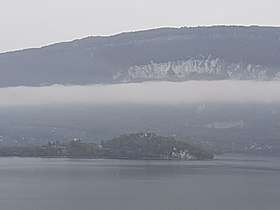 View of Chatillon and Lac du Bourget from Conjux
View of Chatillon and Lac du Bourget from Conjux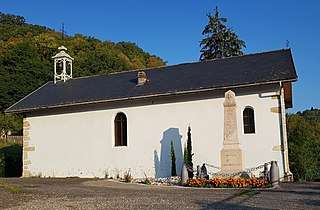 Chapel of Saints-Crépin-et-Crépinien and war memorial, Conjux
Chapel of Saints-Crépin-et-Crépinien and war memorial, Conjux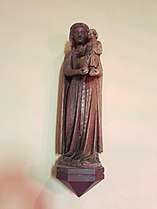 Wooden Madonna, interior of the Chapel of Saints-Crépin-et-Crépinien, Conjux
Wooden Madonna, interior of the Chapel of Saints-Crépin-et-Crépinien, Conjux
Conjux | |
|---|---|
Location of Conjux 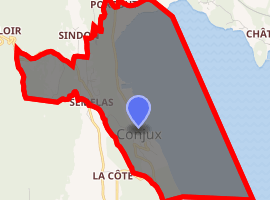
| |
 Conjux 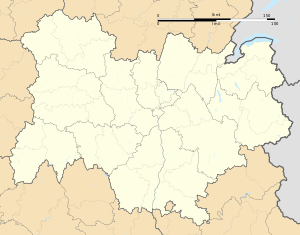 Conjux | |
| Coordinates: 45°47′29″N 5°49′20″E | |
| Country | France |
| Region | Auvergne-Rhône-Alpes |
| Department | Savoie |
| Arrondissement | Chambéry |
| Canton | Bugey savoyard |
| Intercommunality | Grand Lac |
| Government | |
| • Mayor (2014–2020) | Claude Savignac |
| Area 1 | 1.7 km2 (0.7 sq mi) |
| Population (2017-01-01)[1] | 201 |
| • Density | 120/km2 (310/sq mi) |
| Time zone | UTC+01:00 (CET) |
| • Summer (DST) | UTC+02:00 (CEST) |
| INSEE/Postal code | 73091 /73310 |
| Elevation | 225–443 m (738–1,453 ft) |
| 1 French Land Register data, which excludes lakes, ponds, glaciers > 1 km2 (0.386 sq mi or 247 acres) and river estuaries. | |
At 175 ha, the smallest commune in the region of Chautagne, Conjux extends for 5 km along the northwestern coastline of Lac du Bourget; it is bounded to the north by the Canal de Savières and backed by Mount Landard to the west. Reflecting its mixed role as a residential and recreational location, 42% of its residential buildings are counted as secondary residences.
The name of the commune is believed to be derived, via the forms 'Conziacum' (early 12th Century), 'Conjiacum' (1481) and 'Conjeux' (1780), from late Latin 'Congiacum', meaning the 'domain of Congius.'[2][3] Its derivation is not related to the Latin homonym, 'conjux' (spouse).
Fishing was traditionally the mainstay of the village, but today there remain only two professional fishermen based in the commune. The Port of Conjux is now largely used for recreational boating and amateur fishing. Economic activity is largely confined to small businesses, including holiday accommodation and a restaurant, and salaried work in nearby cities such as Aix-les-Bains and Chambéry. The commune maintains a municipal camping ground, Les Babelles, and a bathing beach, as well as managing the boating harbour. The commune is also undertaking a major plan for the development of the port and beach area, the 'Port-Plage' project,[4][5] entailing enlargement of the port, opening up of the Biez rivulet (currently partially piped underground to the lake) to restore the natural waterway, and improvements to tourist and fishing facilities.
The chapel of Saints-Crépin-et-Crépinien at Conjux dates in part from the 15th century. Formerly a parish church, it was not restored to that status following the reestablishment of worship after the Concordat of 1801. It was established as a vicarial chapel in 1883.[3] The building was badly damaged in an earthquake in 1826, fell in ruins in 1886,[3] and was restored in several stages (1890, 1938 and 1978).[6] The rebuilt neoGothic nave has a ribbed vault, linked to a side chapel comprising remains of the 15th Century building. The interior includes a polished wood statue of the Madonna and Child from the 14th Century, Gallo-Roman remains including an inscribed funerary stone, and an altar of Cybele.
An underwater archaeological site, Conjux-le-Port-3, includes visible remains from prehistoric pile dwellings around the Alps, with evidence of occupation from Neolithic to late Bronze Age times and the discernable outline of the now submerged village. Dendrochronological evidence dates the Conjux-Port 1 site from between 832 and 813 BC. The site was classified as an historical monument in 2011.[7]
See also
References
- "Populations légales 2017". INSEE. Retrieved 6 January 2020.
- Gros, Dictionnaire étymologique des noms de lieu de la Savoie
- Michèle Brocard, Lucien Lagier-Bruno, André Palluel-Guillard, 'Histoire des communes savoyardes : Aix-les-Bains et ses environs – Les Bauges – La Chartreuse – La Combe de Savoie – Montmélian (vol. 2)', Roanne, Éditions Horvath, 1984, p. 358–361.
- "Conjux – Port et Plage".
- "Impact Study – Development plan for Conjux harbour and beach (Etude d'impact – Projet d'aménagement port et plage de Conjux)" (PDF).- in French
- Official site of the Commune of Conjux (in French).
- "Monuments historiques". www2.culture.gouv.fr (in French). Retrieved 2018-07-03.
| Wikimedia Commons has media related to Conjux. |